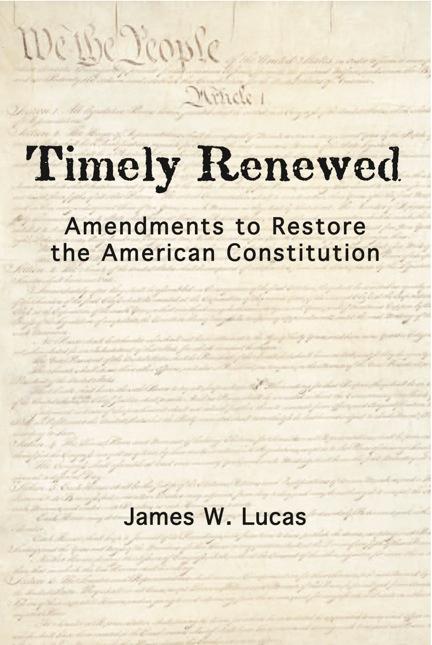Rather than justifying a free-for-all of constiutional disobedience as recently advocated by Professor Louis Seidman, we should use the amendment process to update the Constitution if needed. And if amendment is too difficult, let’s reform it to allow constitutional change to proceed in a democratic and orderly manner. . . . → Read More: Let’s Not Give Up on the Constitution – Amendment Is a Better Solution
|
|||||
The Gay Marriage Cases Are Not About Gay Marriage: The Issue Is Survival of Government by The PeopleThe gay marriage cases before the Supreme Court represent a classic example of judges twisting constitutional language to impose their personal policy views on the nation. There is no basis in any constitutional language for forcing gay marriage on the nation, regardless of its possible merits as social policy. If these merits are so persuasive that gay marriage belongs in the Constitution, the solution is not the anti-democratic process of forcing it on the nation through judicial dictate. The solution is the democratic process of amendment. If amendment is too difficult, let us preserve democratic rule by modest reforms of the amendment process such as the Amendment Amendment, not by continuing our current system of judicial imperialism. . . . → Read More: The Gay Marriage Cases Are Not About Gay Marriage: The Issue Is Survival of Government by The People The new short book Are We The People? shows how we can revive the amendment process so that major constitutional issues can be decided by the democratic method the Framers intended rather than by the fiat of an unelected and unaccountable judicidary. . . . → Read More: Are We The People? is now available – the answer to SCOTUSocracy Professor Sanford Levinson’s recent New York Times op-ed on our “imbecilic” Constitution gets only one thing right – the amendment process is moribund. Professor Richard Epstein’s brilliant response to Levinson gets only one thing wrong – limited government will not be restored voluntarily by regular politicians no matter well schooled they are by Professor Epstein. We need a tool to overcome 80 plus years of Supreme Court decisions underlying the federal leviathan. That tool is a reformed amendment process enabling constitutional amendments to be initiated and enacted at the state level without having to go through either Congress or the dangerous process of a second constitutional convention. . . . → Read More: Professor Levinson and the “Imbecilic” Constitution: Speaking Liberty to Power Even if the Supreme Court rules Obamacare unconstitutional, that will still leave in place all of the previous 75 years of Supreme Court decisions which have allowed the federal government to expand far beyond its original constitutional limits. In the 1930s, the Supreme Court overturned many New Deal expansions of federal power, only to have them all reversed as Roosevelt appointees eventually filled the Court. A Supreme Court decision against Obamacare must not be a cause for complacency in the war against the ever-expanidng power of the national government, including enacting amendments to restore the original constitutional limits on federal power. . . . → Read More: Obamacare: Winning the Battle but Losing the War? A constitutional amendment restoring the original meaning of the interstate commerce clause is the only sure way to reverse not only Obamacare but the rest of the federal regulatory leviathan. . . . → Read More: Obamacare in the Supreme Court – II Part of the attention Newt Gingrich has attracted recently, both good and bad, has focused on his proposals for reining in an activist federal judiciary. Some of the proposals include congressional legislation limiting the federal courts’ jurisdiction in certain areas, abolishing particularly out-of-control courts, presidential defiance of decisions he deems unconstitutional and calling judges before . . . → Read More: Newt, the Judges, and the Constitution The American Thinker has published as a blog item my review of President Obama’s so-called regulatory review (You call this regulatory reform?). Under the direction of Professor Cass Sunstein, President Obama’s former University of Chicago law school colleague, all federal regulatory bodies were to eliminate regulations which were unduly burdensome to small businesses. Private sector critics . . . → Read More: The Constitution and Real Federal Regulatory Reform Many thanks to American Thinker for publishing my article, A Balanced Budget Amendment is not enough – Give Us Back Our Constitution. The comments to the article illustrate the frustration many Americans feel with our federal government. In the last hundred years the Framers’ fundamental constitutional structure has been betrayed by all three of the branches of the . . . → Read More: Beyond the Balanced Budget Amendment – Give Us Back Our Constitution |
|||||
|
Copyright © 2025 Timely Renewed - All Rights Reserved |
|||||



Refusal to Defend: The Abuse of Power Underlying the Gay Marriage Cases
By ignoring US and California state officials’ refusal to defend DOMA and Prop 8, the Supreme Court abetted an egregious increase in executive branch power and attack on the rule of law. Now executive branch officials no longer have to constitutionally repeal laws of which they disapprove in the legislature, they only need to fail to defend them when they are challenged in court. . . . → Read More: Refusal to Defend: The Abuse of Power Underlying the Gay Marriage Cases